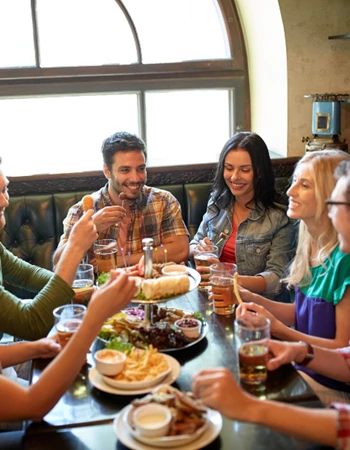-
- Solutions by business priority
- Boost efficiency and profitability
- End to end workforce management
- Attract customers and increase bookings

How to improve customer experience in a restaurant
If you’ve recently received negative feedback, lost out on repeat business, or are just struggling to keep up with your competitors, you may be wondering what you can do to improve the guest experience at your restaurant.
After all, a poor customer experience can lead to fewer returning customers and a diminishing reputation. Whereas a wonderful experience will encourage brand loyalty, which is invaluable in hospitality.
 10 mins
10 mins
Written by Jen Grenside
Here at Access Hospitality, we work with many customers who are utilising hospitality tech to improve the customer experience. In this article, we’ll examine the importance of customer service in restaurants, discuss what makes great customer service, and reveal how you can measure customer satisfaction levels and ultimately improve the service in your restaurant.
Why is restaurant customer experience so important?
Providing an outstanding customer experience is a key factor in generating return customers –it’s one of the most effective revenue-building strategies for restaurants and protects your business from building a negative reputation through reviews and word of mouth.
When you consider that customer retention is five to seven times cheaper than acquiring new customers, it becomes clear how important it is to deliver outstanding customer service, every time.
Your customers are becoming more and more savvy. They want to feel that they are getting value for the money they spend, and that includes which restaurants they visit. That’s why every touch point, from the moment they first hear of you until after they’ve paid their bill, is so important. Because if you fail to meet their expectations, you risk losing their repeat business, and open yourself up to negative reviews.
Conversely, by providing an outstanding restaurant guest experience, you’re more likely to see returning customers, get more recommendations, and in general, better business.
That’s because happy customers will:
- Become returning customers. They’ll come back for more of the same, or to explore different menu options.
- Spend more money on subsequent visits, whether that’s through tips or larger orders.
- Suggest your restaurant to their friends, building your customer base.
- Leave positive feedback through reviews and social media posts, strengthening your reputation.

What makes a great guest experience?
So, what makes a great guest experience in a restaurant? There are multiple things to consider if you want to make your customers happy.
Branding and Aesthetics
The guest experience at your restaurant begins the first moment that your potential customers encounter your brand, whether through signage, social media, or your website, how you present yourself will create that all-important first impression.
A visually appealing and captivating restaurant will outshine one that lacks visual appeal. This impression continues as customers enter your restaurant; a clean, organised, and well-presented space elevates your restaurant's appeal.
Efficiency and Staffing
Customers want to feel like they’re being taken care of. Short wait times are essential, but when delays are unavoidable, transparency becomes paramount. Equipping your waiting areas with amenities such as a bar and television, will help enhance the customer experience during busy periods, and allow them to enjoy their time at your restaurant even if they’re not presently seated.
When it comes time for your guests to pay, make the process as simple and convenient as possible; a wonderful experience can be completely undermined by an unnecessarily long wait for the bill, or not being able to pay with their preferred method of payment.
Staffing your establishment effectively will go a long way towards making sure everything is done in a timely manner. While it can be difficult to juggle the commitments and schedules of your staff, it’s worth putting in the work to make sure your customers are attended to, and kitchen wait times are within expected levels.
Service Quality
Friendly, informative, and organized service is fundamental. Striking a balance between providing space for customers to enjoy their meals while assuring them that assistance is readily available is key. Your staff should be attentive to refill drinks, address queries, clear plates, and present the bill promptly.
In a competitive industry, exceptional service distinguishes your restaurant from competitors. While food quality is vital, the overall experience, including staff interactions, can foster brand loyalty.
Pricing and Menu Options
Rising food costs have put restaurants in a tough spot, often leading to higher menu prices. However, faced with the strain of a cost-of-living crisis, customers are increasingly budget-conscious and hesitant to spend.
Striking the right balance between justifying higher prices due to elevated food costs while respecting customers' financial constraints has become a critical challenge for the restaurant industry. It requires a nuanced approach to pricing, focusing on quality, value, and affordability, all while communicating these factors effectively to patrons to ensure their continued loyalty in these trying times.
In today's dining landscape, offering a diverse range of food choices is paramount. Customers have increasingly diverse palates, dietary preferences and restrictions, making it essential for restaurants to provide options that cater to various tastes and needs. Whether it's vegetarian, vegan, gluten-free, or other specific dietary requirements, a well-rounded menu ensures that every guest can find something to enjoy.
Equally vital to the guest experience is how knowledgeable your servers are. Well-trained, knowledgeable staff who can confidently explain the menu (including ingredients, preparation methods and allergen information) play a pivotal role in ensuring a seamless and enjoyable dining experience.
When staff can provide accurate recommendations, address queries, and accommodate special requests, it not only enhances the overall dining experience but also instills trust and confidence in the restaurant. Your guests are more likely to return and recommend the restaurant when they feel that their needs are understood and well-catered to - highlighting the impact of staff training and menu knowledge on guest satisfaction and loyalty.
Atmosphere and Management
Good service is generally about keeping the customer happy, which can mean making changes to the environment and the people in it. Playing appropriate music, setting the right lighting, and dealing with boisterous customers promptly will elevate the experience for everyone.
Consistency
Maintaining high standards across all aspects of the dining experience is the key to a business’s long-term success. Consistency in branding, service, pricing, menu diversity, and staff proficiency is what builds trust and loyalty among customers. It assures patrons that every visit will meet or exceed their expectations, creating a reliable and positive reputation for your restaurant.
Whether a first-time guest or a loyal customer, the assurance of a consistently exceptional experience keeps diners coming back and encourages them to share their positive experiences with others. In an industry where word-of-mouth and online reviews can make or break a business, the importance of unwavering consistency cannot be overstated.
Maybe also look to address the challenge of operators being short staffed and the impact on customer service and kitchen waiting times - this is a highly topical point in the industry.
Make sure we address the challenge readers might be facing of a lot of competitors - and how good customer service will set them apart and stop customers looking elsewhere.

Measuring Customer Satisfaction
So, you’ve put in all this hard work to make sure your restaurant is running smoothly. You’ve done everything in your power to make the customers happy. But how do you know if it’s working?
Fortunately, there are several ways that you can measure customer satisfaction.
Returning Customers
One of the most effective ways for a hospitality business to gauge customer satisfaction and returning customer rates is by harnessing the power of sales and CRM data.
By scrutinising transaction records and CRM data, businesses can identify patterns of returning customers. These records reveal not only the frequency of visits but also the specific preferences and behaviours of individual customers. Tracking this information provides valuable insights into what keeps customers coming back, allowing businesses to tailor their offerings and services to better meet customer expectations and build enduring relationships.
Additionally, CRM systems enable personalised communication and targeted marketing efforts, further solidifying customer loyalty and engagement, while also providing measurable metrics for evaluating the success of these initiatives. This data-driven approach ensures that customer retention efforts are not only effective but also aligned with customer needs and desires, fostering a strong foundation for sustained success in the hospitality industry.
Complaints
Customer complaints serve as a valuable measure of satisfaction and provide an opportunity for practical improvement.
When handling complaints:
- Start with active listening, allowing customers to express their concerns uninterrupted
- Show empathy and patience while avoiding anger or arrogance
- Assess the issue, offer realistic solutions, and validate the customer's perspective.
By addressing complaints effectively, you not only resolve immediate concerns but also demonstrate your commitment to enhancing customer satisfaction and loyalty. This approach turns complaints into a powerful tool for continuous improvement in the guest experience, fostering long-term success.
Reviews
No matter the industry, reviews are one of the most trusted ways to measure customer satisfaction. So much so that scores from review aggregator sites are something many companies proudly display on their websites.
Reviews allow customers to give feedback with the benefit of hindsight and articulate their thoughts more clearly (although this isn’t always the case). Unfortunately, it’s also human nature that people are more likely to write a review if they’ve had a bad experience, rather than a good one.
In these instances, your first instinct may be to ignore them or tell them why they’re wrong, but these are some of the worst things you can do, as that can make you look apathetic and drive away potential customers.
So, with that in mind, like complaints, you should approach every review with patience and understanding, even if you think the reviewer is out of line. Examine what they have to say, look for any valid points, and ask for more clarification where necessary.
Finally, be prompt with your response; apologise and see what you can do to remedy the situation. If an issue is particularly complex, consider dealing with it privately.
Alternatively, to cut through the more emotionally driven responses, businesses can get a more balanced measure of customer satisfaction by utilising feedback software.
Guest feedback and survey systems allow you to prompt and collect more reviews from all of your diners. Rather than waiting and hoping people will go home and leave a good review, you can encourage them to give their opinion while they’re still on the premises.
Social Media
There are 4.89 billion social media users in the world, which makes it a great avenue to spread positive word of mouth.
While people may not be as eager to leave a positive conventional review unprompted, there’s a good chance, depending on what they use social media for, that they’ll give your restaurant a mention in one of their posts.
Whether it’s raving about the food or service, an offhand mention, or a picture of one of your dishes, social media can encourage discussion about your establishment that can, in turn, become more business.

Steps You Can Take to Improve Customer Experience
We’ve already touched on what makes a great customer experience and what you can do to influence it, but let’s dig a little deeper into the steps you can take to improve the customer experience at your restaurant.
Control Your Image
As we’ve mentioned, branding and image are very important. So, if you’ve not got a set brand identity or online presence, you should make one. By putting yourself out there, you can start to form an image of who your restaurant is that customers can engage with, get to know, and ultimately support.
Extend that image into the real world with advertisements and signage that highlight your brand identity.
A hospitality CRM is a great way to help establish your image and connect with customers digitally. Such software allows you to use tailored campaigns to connect with the right customers and offers data insights that you can use to strengthen your business further.
Keep It Clean
Hygiene is incredibly important in the food service industry.
A 2016 survey reported that 75% of customers would never visit a food outlet that had caused food poisoning or suffered a hygiene incident unless it had changed owners, while 66% said they wouldn’t return to somewhere unclean.
So, maintaining a clean and hygienic business is of critical importance. But there’s a lot to keep on top of, and while having operational processes in place can protect your business from human error or misjudgement it’s still a time-consuming part of running a food-based business. That’s why it makes sense to utilise a hospitality checklist app. These digitise the working day and give staff a list of jobs that need to be completed by a certain time. They can be automated for repetitive workflows and allow staff members both new and old to keep on top of their usual tasks, as well as any ad hoc tasks that materialise.
Deliver Excellent Service
To deliver the best service, your staff need to be on the ball, giving timely, friendly, and understanding service.
This all starts during the hiring process. The candidates you choose should display empathy and resilience and should go through comprehensive restaurant customer service training. Whether that’s using hospitality e-learning courses or a hospitality LMS, it’s important to give your staff the training they need to thrive.
It’s also important to remember that while you may be able to get by with minimal staff, your customer experience may suffer as a result. Study your busy periods and be mindful of upcoming events so you can create an optimised rota. You could even use a smart scheduling system to make this easier. Smart scheduling systems can use historic data and create a theoretical forecast and staff accordingly.
Taking these steps will mean the whole restaurant system moves more fluidly as you are prepared for every eventuality.
Manage Expectations
You and your staff need to know your limits and be honest with your customers about your capabilities.
Honesty and transparency about things like wait times allow customers to make an informed decision, and fosters trust for future visits. It won’t do you any favours to have people sitting or standing around getting impatient and annoyed.
Manage customer expectations so as not to waste your or your customers' time. People will be grateful for your honesty and may stick around anyway, especially if you have a nice waiting area with amenities to keep them occupied.
Keep on top of Maintenance
Proper maintenance of important equipment is vital. From the various kitchen appliances needed to make the food, to your restaurant EPOS, and the air conditioning, to your music systems, there are a lot of important aspects to creating that perfect customer experience.
If any of these breaks down, it can have a huge impact on the running of your business - limiting your menu, your ability to take payments, or creating an uncomfortable environment for customers and staff. All of these things can hurt your restaurant’s reputation. That’s why you need to make sure everything in your establishment is well taken care of, and you have contractors available to fix things as and when they need it. Using facility management software is a great way to manage contractors and hire trustworthy professionals to help you out in your time of need.
Ready to Improve Guest Experience?
In this article, we've explored the key elements that contribute to an exceptional guest experience in the restaurant industry. From the importance of branding, ambiance, and pricing strategies in today's challenging economic climate, to the need for diverse menu options and well-trained staff, we've delved into practical measures for enhancing customer satisfaction. We've also emphasised the significance of customer feedback, both in the form of complaints and reviews, as valuable metrics to measure and drive improvement.
To elevate your restaurant's guest experience, consider implementing these insights, prioritising consistency, and actively engaging with customer feedback. By focusing on these aspects, you can create a dining environment that not only meets but exceeds customer expectations, fostering loyalty and long-term success in the competitive restaurant industry.
If you’re interested in how hospitality software can help you boost customer satisfaction in your business, get in touch for a one-on-one conversation about the software that could help you. Whether you’re looking to upgrade or starting from scratch, we can help you integrate or improve your current systems.
Learn more
Read more about delivering a great customer experience and building customer relationships






